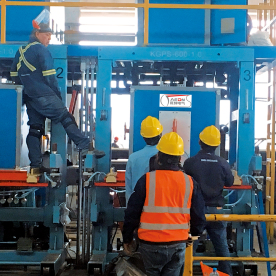Induction heating technology has transformed the way heat is applied in various industrial processes. Portable induction heating equipment is particularly notable in that it brings the efficiency and precision of induction heating directly to the job site, making it an invaluable asset for technicians and engineers in numerous fields. This article delves into the advantages, practical applications, and the future of portable induction heating equipment.
Understanding Portable Induction Heating Equipment
Portable induction heating equipment uses electromagnetic fields to generate heat in conductive materials without direct contact. The technology is based on the principles of Faraday’s Law of Electromagnetic Induction, which generates heat in metal objects placed within a varying magnetic field. This method is highly efficient as it minimizes heat loss and focuses energy directly on the workpiece. The compact and lightweight designs make these devices easily transportable, allowing for versatile use across various job sites.

Exploring the Advantages, Applications, and Future of Portable Induction Heating Equipment in Modern Industries
Advantages of Portable Induction Heating Equipment
1. **Efficiency and Speed**: One of the chief benefits of portable induction heating equipment is its speed. Traditional heating methods, such as ovens or torches, require time to reach the desired temperature. In contrast, portable induction units can typically achieve target temperatures in seconds, drastically reducing downtime and increasing productivity.
2. **Precision Heating**: Induction heating allows for precise temperature control, which is crucial in applications requiring specific heating profiles. This precision minimizes the risk of overheating and reduces the chances of thermal distortion or damage to sensitive components.
3. **Safety**: Induction heating is safer than traditional heating methods. There’s no open flame, reducing the risk of fire hazards. Additionally, the surface of the induction heating coil remains cool to the touch, minimizing the risk of burns or accidents.
4. **Energy Efficiency**: Portable induction heating equipment is designed to maximize energy efficiency. The direct heating method means that less energy is wasted, making it a more sustainable option compared to other heating techniques.
5. **Versatility**: The compact nature of portable induction heating devices makes them suitable for a wide range of applications. From brazing and soldering to heat treating and shrink fitting, these devices can cater to numerous industrial needs across multiple sectors.
6. **Reduced Environmental Impact**: With an increase in energy efficiency and lower emissions compared to conventional heating methods, portable induction heating equipment contributes positively to environmental sustainability.
Applications in Various Industries
Portable induction heating equipment finds applications across many industries, including metalworking, automotive, aerospace, plumbing, and more.
1. **Metalworking**: In metal fabrication, induction heating is used for processes such as hardening, tempering, and annealing. This equipment is essential for preparing components by ensuring they meet the required hardness specifications.

Exploring the Advantages, Applications, and Future of Portable Induction Heating Equipment in Modern Industries
2. **Automotive**: In automotive repair and manufacturing, portable induction heaters are used for tasks like bearing removal or heat treatment for hardening parts. Their ability to quickly heat a specific section of a component is particularly useful.

Exploring the Advantages, Applications, and Future of Portable Induction Heating Equipment in Modern Industries
3. **Aerospace**: The aerospace industry relies heavily on precision and safety. Portable induction heating equipment is used for applications like joint brazing and heat treatment of aircraft components, ensuring they meet demanding safety standards.
4. **Plumbing**: In plumbing, it is commonly used for soldering pipes. The portability of these devices allows plumbers to work effectively in various locations without the hassle of bulky heating equipment.
The Future of Portable Induction Heating Equipment
The growing emphasis on efficient manufacturing and environmentally friendly processes positions portable induction heating equipment at the forefront of future industrial applications. As technology advances, we can expect to see innovations that enhance functionality, including smarter controls and connectivity, enabling operators to monitor and adjust the heating processes remotely.
Moreover, as industries increasingly adopt automation and robotics, the integration of portable induction heating devices into automated systems will likely strengthen their relevance across sectors.
Conclusion
In conclusion, portable induction heating equipment represents a significant advancement in heating technology. Its efficiency, precision, and versatility make it an ideal solution for a broad range of industrial applications. As the need for energy-efficient and environmentally responsible methods grows, the demand for portable induction heating solutions will likely increase. Continued innovation in this field promises to enhance performance further, setting the stage for a new era in industrial heating processes.Pipe making machine with precision cutting function



